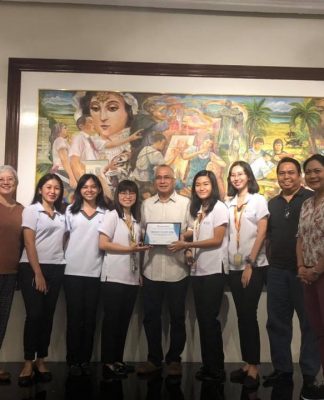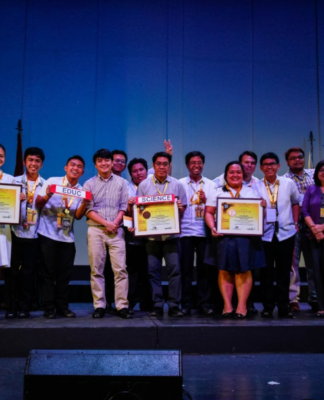ON SEPTEMBER 5, 1992, the then newly-elected Master of the Order, Rev. Fr. Timothy Radcliffe, O.P., arrived at the curia of the Dominicans. An unassuming 36-year-old Argentinean welcomed him at the corridors and led him to his room. As they walked along the corridors, they passed by a beautiful gallery that featured the portraits of all the previous Masters of the Order. Earlier, the young Argentinean mischievously hung Radcliffe’s tiny-framed photo next to the full-sized portrait of his predecessor Rev. Fr. Damian Byrne, O.P.
When Radcliffe saw the picture, he stopped and turned to a Dominican sister, and said in very bad Italian but in very good humor, “Don’t worry, I’ll get bigger with the help of your pasta in the next nine years!”
Last July 14, barely nine years after he played that harmless joke, the unassuming Argentinean, now 44, found himself elected to succeed Radcliffe.
Rev. Fr. Carlos Alfonso Azpiroz Costa, O.P., the first Argentinean and the second non-European Master of the Order of the 787-year old Dominican Order, was elected by 127 out of 214 Dominican attending the General Elective Chapter of the Order in the Priory of St. Thomas, Providence College, Rhode Island.
Fr. Quirico Pedregoza, O.P., immediate past provincial of the Philippine Dominicans, was also nominated as Master of the Order. He was later elected as socius or assistant to the Master of the Order for the Asia-Pacific.
The Chapter began last July 10 and will end on August 8, the solemnity of founder St. Dominic de Guzman.
The General Chapter, which is the highest authority in the Dominican Order, is a triennial assembly of friars
representing the Order’s Provinces. They gather to discuss and define matters concerning the Order and to elect a new Master Order of Friars and Preachers every ninth year. The last General Chapter was held in the Priory of St. Dominic, Bologna, Italy in 1998.
Diffinitors make up the lower chamber of the house in the Dominican bicameral government. On the other hand, the upper chamber of the house is composed of the Provincial Priors with the Master of the Order as head.
Normally, there are three types of General Chapters in the Order through a nine-year cycle. The first is the General Chapter of Diffinitors, followed by the General Chapter of Provincial Priors on the sixth year and capped by the General Elective Chapter on the ninth year, when both the Diffinitors and the Provincial Priors elect a new Master of the Order. A special General Chapter is called anytime when the need arises.
The General Chapter is above all a legislative assembly. A proposal becomes a law and takes effect for the whole Order after mustering a favorable vote in a General Chapter. It becomes part of the Dominican Constitution when it gets three successive favorable Chapters’ votes.
Besides its primary legislative function, the General Chapter also has a disciplinary function—judges, punishes, and deposes. The Chapters also address contemporary problems on the life and mission of the Order. They also give directives and orientations on the best way of living the charism proper to the Order and reaching out to the men and women in today’s society. The General Chapter, which brings together the Order’s representatives worldwide, allows the Dominican community to discuss the apostolic ministry of the friar preacher in the context of today’s realities.
In a letter addressed to Radcliffe, Pope John Paul II invoked the Holy Spirit to guide the General Chapter as Dominicans gathered to elect their 87th Master General.
He urged them to reflect the intimately related themes of “Preaching the Gospel in a Globalized World” and “The Renewal of the Contemplative Life.”
The Pope further stressed that the Gospel could be preached in fresh and effective ways in a fast-changing world only if Christians followed the path of contemplation which leads to a deeper relationship with Christ, “known through his manifold presence in the Church and in the world, and confessed as the meaning of history and the light of life’s journey (Novo Millennio Ineunte, 15).”
Election
Six representatives in the General Chapter came from the Philippines. Rev. Fr. Ernesto Arceo, O.P., the Provincial Prior of the Philippine Dominican Province, led the delegation. Other members were Rev. Fr. Jaime Boquiren, O.P. as the Socius of the Provincial, Rev. Fr. Edwin Lao, O.P. as diffinitor, Rev. Fr. Quirico Pedregosa, O.P., as moderator, Rev. Fr. Eladio Neira, O.P., as Regional Vicar of the Holy Rosary Province (Spanish Dominicans), and Sr. Zenaida Nacpil, O.P., who represented the Dominican Sisters International Asia-Pacific.
Rev. Fr. Honorato Castigador, O.P., who was the Philippine Provincial Prior during the 1992 General Chapter in Mexico, said the Master of the Order’s election requires a lot of communication.
It has become customary that before the election, a candidate would be nominated by each continent. It would be an advantage if the candidate has a mastery of the three official languages of the Order: English, Spanish and French.
Aside from Azpiroz, Fr. Pedregosa and Rev. Fr. Bonifacio Solis Garcia, O.P. from the Holy Rosary Province in Hong Kong were also nominated.
New Master
When Azpiroz was nominated for Master of the Order, the Dominican Fathers here in the Philippine Province saw him as a potential winner. According to Rev. Fr. Winston Cabading, O.P., Azpiroz was a sure bet for the position for his knowledge of the structure of the Order, and his training in both canon and civil laws. He also has mastery of English, French, Italian and Spanish.
Radcliffe also expressed faith in his successor’s competence. “One of the main tasks of the Master of the Order is to have care of its unity. This Carlos will be able to do so well because he is a man who transcends all ideology. He has the intellectual openness and the imagination to understand other people’s positions, their fears, and their hopes, but lead them into a larger space, beyond dichotomy,” Radcliffe said in his welcome speech to Azpiroz.
The new Master of the Order was born in Buenos Aires on October 30, 1956. He was eighth in a family of 14 – 13 boys and a girl.
In an interview with Rev Fr. Claude Vézina, O.P., Master Azpiroz narrated his upbringing in Argentina and how his mother, Nélida Victoria Costa Colombo, was instrumental in leading him to the Order. According to him, they only lived a simple lifestyle and it was his mother who taught him his faith values.
Azpiroz completed his primary and secondary education at the Colegio Champagnat de Buenos Aires, which is run by the Marist Brothers.
The turning point in his life came when he studied law at the Pontifical Catholic University in Buenos Aires. He met two Dominican professors in the University who became his confidantes about his desire and uncertainty to answer his Dominican calling. His restlessness finally came to an end during his retreat at the Order’s novitiate in Mar del Plata.
Azpiroz entered the Dominican novitiate of the Argentinean Province of Saint Augustine on March 1, 1980. He made his first profession on February 28, 1981 before the then prior Provincial of the Argentinean Province, Fr. Michel Jean Paul Ramlot, O.P.
On March 10, 1984 he made his solemn profession at the Priory of Albert the Great in Buenos Aires where he completed both his Philosophy and Theology degrees. Cardinal Eduardo Francisco Pironio, a member of the Dominican Third Order, ordained him deacon on August 8, 1986. The following year, he was ordained to the priesthood on the vigil of the Solemnity of the Assumption.
In September 1989, the Prior Provincial, with the consent of then Master of the Order Damian Byrne, sent Aspiroz to Rome to study Canon Law at the Angelicum. He was assigned to the Priory of Santa Sabina where he worked with various assistants to the Master of the Order in secretarial jobs. He received the Doctorate in Canon Law in November 1992, and later published his thesis, “The Provincial Chapter in the Book of Constitutions and Ordinations of the Order of Friars Preachers—A Comparative Study with the Constitutions of 1932.”
Prior to his election, he last served as the Procurator-General of the Order.
When asked about the issues he will prioritize, the unassuming Azpiroz pointed out that the result of the General Chapter would be his basis in leading the order in the next three years.
“I don’t have any personal agenda, because I’m here to hear the brothers and to see how the Acts come out. When they asked me what I thought were two of the most important topics in the Church and the Order today, I told my brothers, first, inter-religious dialogue between the major religions, and second—and this could be the background for a lot of discussion for the next millennium—human rights,” Azpiroz told Fr. Vézina.
He likened the Dominican Family into a symphonic orchestra.
“You have everything from bass drummers to flute-players. Some might not like the flute or the drum, but when all the musicians play together, the symphonic orchestra sounds good. And the different parts need each other. Truth is a symphony, truth is our music. And if I could impress on the mind of all the capitulars one recollection of Timothy, it is that he invited us time and again to sing a new song. And through the music of truth we are a symphonic orchestra,” Azpiroz concluded.
Remembering his encounter with then Master General Radcliffe nine years ago, Azpiroz said, “I still have that tiny photo to this day and I will put it in my personal office just to have the smile of Timothy every day in front of me.”

















